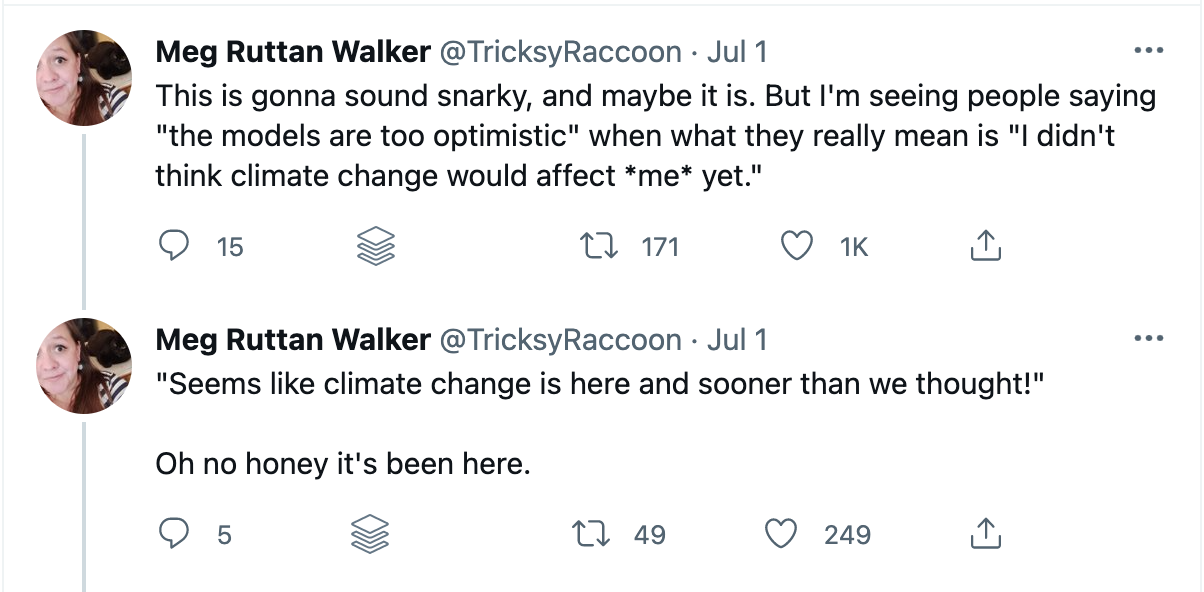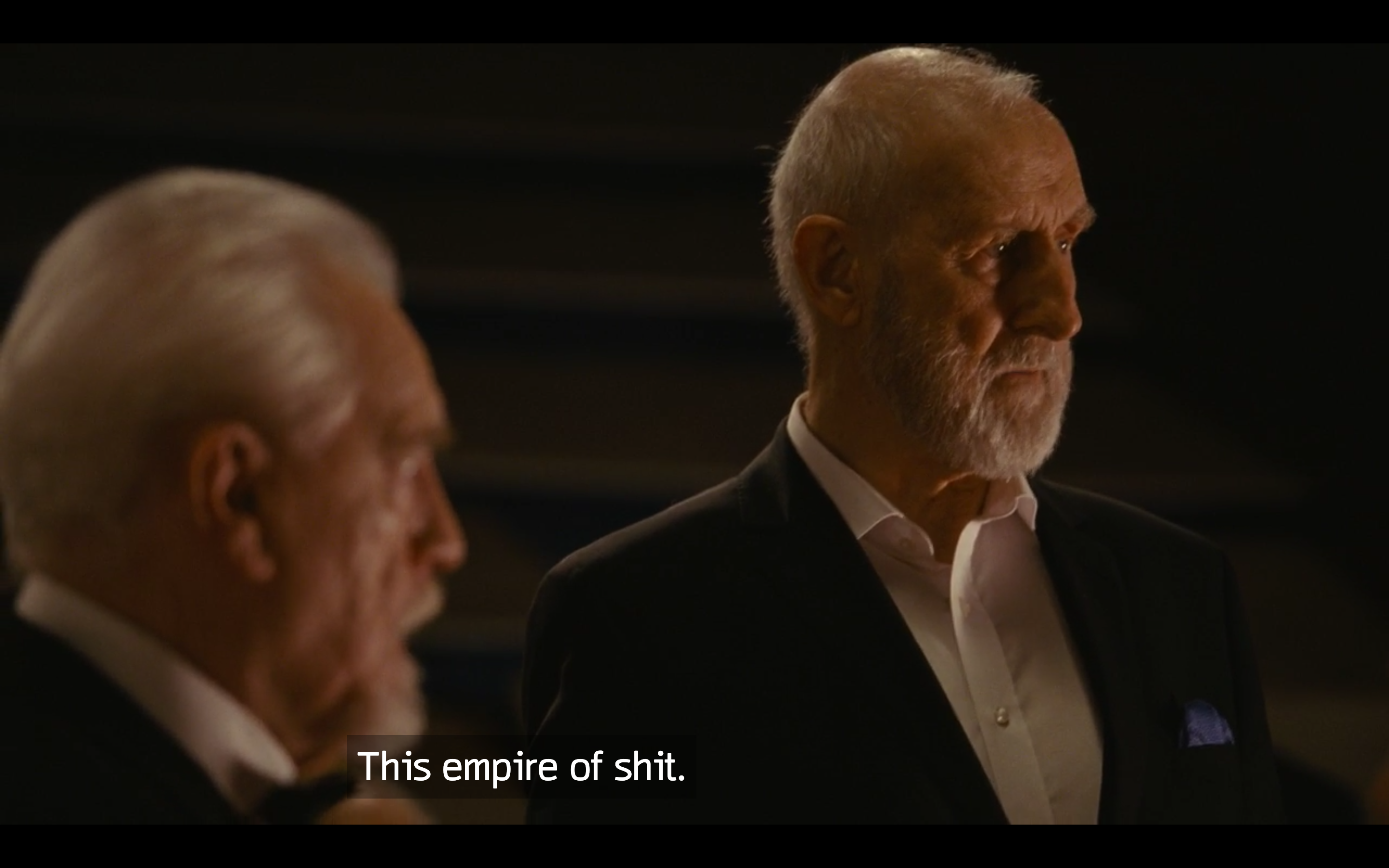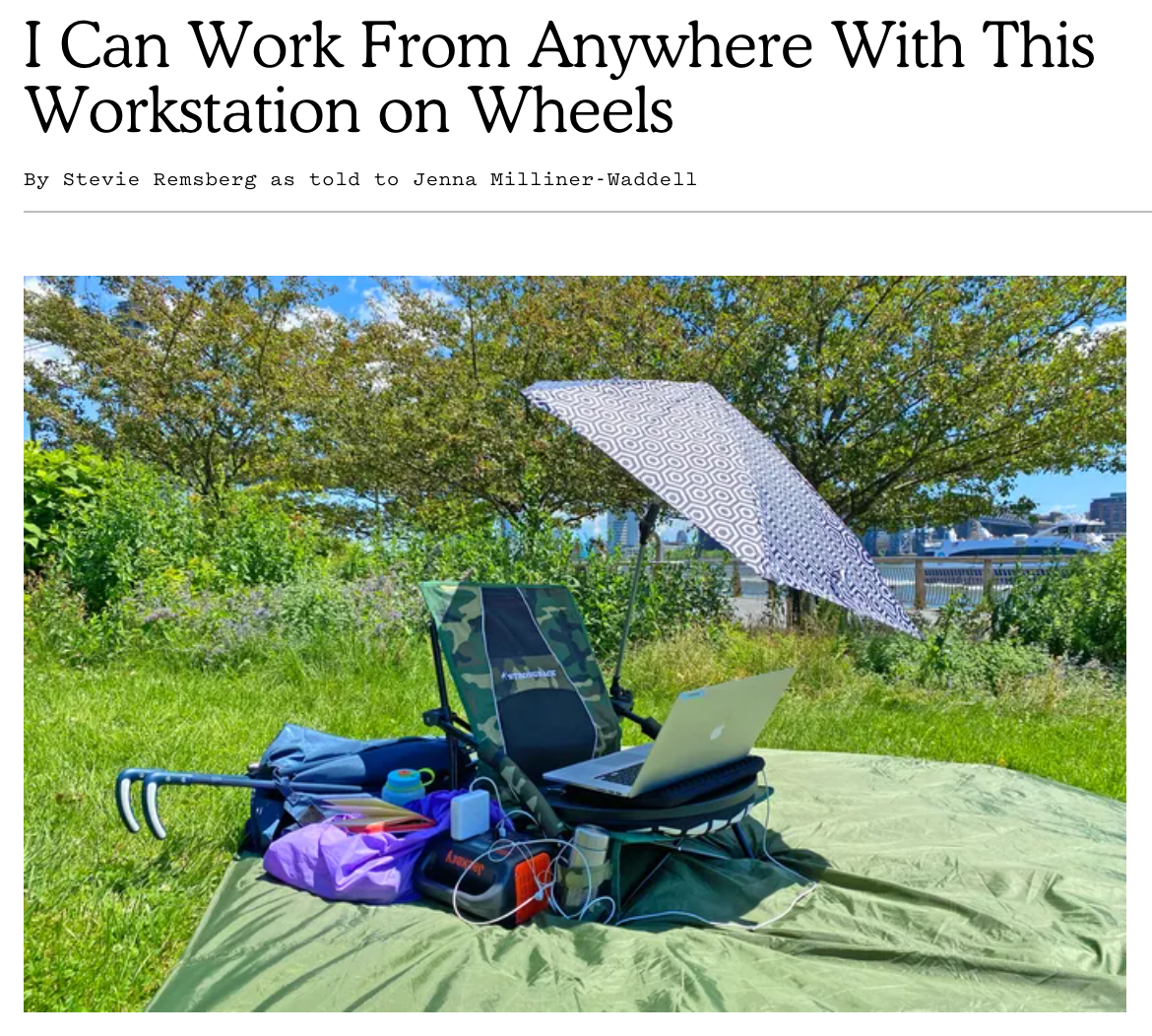88: This dead world
For a while we all get a good look at what exactly we are reaping and none of us can easily turn away

Sand Dunes at Sunset, Atlantic City, Henry Ossawa Tanner, c. 1885
--
When the infamous "hothouse Earth" study came out a couple years ago, painting a picture of the irreversible catastrophe that could be created by runaway climate change, journalist Eric Holthaus encouraged people who were appropriately terrified to remember that the point here is that this future is not inevitable, and we should use such terrifying possibilities as cause to redouble our commitment to urgent action. "This dead world is not our destiny," he wrote, which is a sentiment that I periodically return to when things seem really bad.
But now and then, through a convergence of trends, coincidence, and terrible decisions, it's like a portal opens up and for some period of time we get a glimpse of this dead world. I don't mean that the past week was the same as living in the doomsday scenario of hothouse Earth, not even close, and we don't even need that particular worst-case scenario in order to be terrified, because we are already experiencing lesser but still deadly versions of it all over the world, all the time. What I mean is that we occasionally get a good taste of just what it is that we are fucking with here. For a while, we all get to take a good hard look at what exactly we are reaping, and it's something that none of us can easily turn away from.
This past week was one of those little windows, during which it felt like the full reality of climate change reared its head up from the sand for a moment, took some of us in its jaws, and then dove back under. Even for those of us not severely impacted by the week's extreme weather, there was that ambient hum of anxiety hanging in the atmosphere combined with varying levels of discomfort in the form of the syrupy heat brain that slows down your will to do much of anything other than get the hell out of this heat even just for a second.
It was also one of those weeks where it was hard to even keep up with everything that was happening. So this is going to be one of those occasional mostly-links newsletters where I just try to take stock of things for a minute here. Where we all just take a second. Here are some of the things that happened.
Pain and suffering
* Lytton, B.C. broke the record three days straight for the hottest temperature ever recorded in Canada, peaking at 121.3 degrees. And then, a wildfire burned 90% of the town. "There won't be very much left of Lytton.” Lytton is northeast of Vancouver, about the same latitude as London.
* The heatwave broke, but in Canada it has been followed by wildfires across the west, with more than 100 burning as of Friday, 86 of which started in the past two days.
* The heatwave in the Pacific Northwest and British Columbia was "of an intensity never recorded by modern humans,” considered a “once in a millennium” event. The heat dome is the combination of patterns in the jet stream and human-caused climate change, which makes events like these more common and more extreme. Two weeks prior, another history-making heatwave hit the Southwest, Intermountain West, and California.
* Hundreds died as a result of the latest heatwave, with the death toll at 79 in Oregon alone, where in the past 20 years combined there were just 72 heat-related deaths recorded. British Columbia recorded at least 486 sudden deaths from Friday to Wednesday afternoon, a five-day period in which 165 such deaths are typically reported.
* The Portland Streetcar was forced to shut down because the heat melted its power cables.

* Heat-induced illness spiked in the region, as seniors and people experiencing homelessness in particular suffered vomiting, loss of consciousness, fatigue, confusion, and dizziness, the symptoms of heat stroke. In King County in Washington, there were 41 heat-related visits to emergency rooms on Saturday and 91 on Sunday, while the previous daily record was just 9.
* Super-high temperatures are shocking and dangerous, but just as deadly is the combination of lower levels of high heat combined with high humidity. At a certain point, sweating and evaporation will stop dissipating the heat, causing the body’s core temperature to rise and eventually shutting down organs. This danger is measured by the so-called “wet bulb temperature” at which evaporative cooling can occur. When the wet bulb temperature hits 95, a location reaches an "unlivable heat" because the body becomes unable to regulate its temperature.
* The heat triggered rolling blackouts as temperatures and energy use threatened to blow out transformers, strain power lines, and break other equipment. Someone from a utility said they have never “experienced this kind of demand on our system and this kind of impact to our system. This is very unprecedented.”
* Record heatwaves also roasted parts of Eastern Europe and Siberia, leading to drownings in rivers and swimming pools as people swarmed bodies of water to cool off. In a recent study, scientists concluded that “human-induced climate change has dramatically increased the probability of the frequency and magnitude of heatwaves in the larger Siberian region.” Satellite imagery this week recorded ground temperature in at least one location in Siberia above 118 degrees Fahrenheit (that is in the Arctic Circle).
* Last weekend in Detroit, a cloudburst created by a cold front and a mass of humidity colliding hammered the city with rain, overwhelming its drainage system. Between 1958 and 2012, the heaviest 1% of storms in the Midwest became 37% more powerful. “The drainage system was working as it was designed to; it just isn’t equipped to handle that much rain.”
* Teviston, a small rural community in California’s Central Valley, lost its running water during a drought as temperatures hit 100+. Their only functioning well broke and residents are either leaving town or relying on bottled water for drinking, cooking, bathing, and flushing toilets. The pump should be fixed in two weeks but local officials fear the well has actually dried up. Teviston isn’t an isolated incident, as thousands of wells in the San Joaquin Valley are at risk of drying up this summer.
* As of earlier this week, there were two dozen wildfires in Arizona that had burned more than 366,000 acres so far, signaling a wildfire season on pace with the past two years. A UA professor who studies the history of fires put it bluntly: “You can’t put a Band-Aid on this problem. There is no simple fix until you get serious about climate change.”
* Boston hit 100 degrees Wednesday for the first time since 2011, blowing past the record for that day, which was set in 1945 at 95 degrees. We also just wrapped up the hottest June in the city’s history.
* A recent report found that record-setting heat and drought in parts of the US are threatening the long-term power supply, as fossil fuel plants and nuclear power plants require massive amounts of water to operate.
Obstruction and delay
You might expect terrifying conditions like this would increase a sense of urgency around climate action, but you would be wrong. Even though he said this week that “we have to act and act fast” on climate change, Biden achieved a bipartisan “victory” by cutting his celebrated infrastructure plan to one quarter of its original size and stripping it of most of its key climate change measures, abandoning several campaign promises. This is following the pattern of an enduring, enormous gap between the Biden administration’s stated climate ambitions and its actions.
* Items that were stripped from the bill include a national renewable energy standard, hundreds of billions in tax incentives for clean energy, and an end to the almost $15 billion in handouts the federal government showers on the oil, gas, and coal industries, artificially lowering their costs.
* Electric vehicle and transit spending is much smaller, environmental justice spending is whittled away to almost nothing, and there’s not even any spending on energy research and development, which climate conservatives disingenuously claim they support.
* The administration and Congressional Democratic leaders are insisting that they will pass a separate bill in reconciliation that will close the gap, but honestly that seems impossible considering they would need every Senate Democrat to vote yes and at least one of them is pretty clearly in the pocket of the oil industry.
And the reason we know that (at least the latest smoking gun) is a recent Greenpeace UK investigation that caught Exxon lobbyists talking, at length, about the extent to which the company is working to block climate action, including in this infrastructure bill. Exxon like most oil companies made a public-facing pivot to frame itself as part of the solution to climate change, but we all know that is complete horseshit and Keith McCoy, a senior director of federal relations for Exxon Mobil, made that very clear for everyone. Some of the things McCoy offered up:
* On the infrastructure bill, Exxon was very worried that if it got too big, it would have to be paid for by rolling back Trump’s corporate tax cuts, which would cost them billions. So they lobbied to strip the bill down to just pre-climate crisis infrastructure priorities: “you stick to highways and bridges, then a lot of the negative stuff starts to come out” by negative stuff he means stuff that must absolutely happen to rein in global catastrophe. And all that stuff got taken out!
* The Exxon lobbyist listed several Democratic senators the company is targeting, one of which is, of course, Joe Manchin, who is a guy from West Virginia who because American democracy is a disaster somehow holds the fate of the world in his stupid hands. “Joe Manchin … I talk to his office every week. He is the kingmaker on this, because he’s a Democrat from West Virginia, which is a very conservative state, and he’s not shy about sort of staking his claim early and completely changing the debate.”
* Exxon has worked to deny climate science and sow doubt in order to prevent regulation. “Did we aggressively fight against some of the science? Yes. Did we join some of these shadow groups to work against some of the early efforts? Yes that’s true. But there’s nothing illegal about that. We were looking out for our investments, we were looking out for shareholders.”
* The company’s public support for a carbon tax is nothing but a PR move, a “a great talking point” for the company, but something they can comfortably back because they know it will never happen.

And one more good one!
* A report from Brown researchers concludes that from 1989 to 2009, the US Chamber of Commerce was a “powerful force in obstructing climate action.” The report looked at dozens of documents and found concerted messaging campaigns to prevent public concern over climate action and protect the bottom line of corporations.
Resistance and relief
* This week, hundreds of climate activists descended on the White House to protest the Biden administration’s abandonment of his promises on the issue. Led by Sunrise Movement, which has been an ally to the Biden campaign and the administration, the demonstrators rallied across the street from the White House holding signs calling the president a coward, and eventually blocked entrances which led to arrests. No permanent friends, no permanent enemies. "When the next climate disaster hits, the next wildfire comes or the next hurricane comes, it won't be bipartisanship that saves us all,” 18-year-old John Paul Mejia told NPR.
* Demonstrators led by Native water protectors continue to fight the Line 3 tar sands pipeline, which would pump hundreds of thousands of barrels of oil through Minnesota’s wetlands, which by the way is oil that we cannot burn. In Waltham, Mass., protestors were arrested after occupying overnight the offices of the Canadian energy company behind the project. In a classic example of state violence supporting corporate violence, a Minnesota sheriff’s office barricaded access to the private property where protestors have set up an encampment that has served as a jumping off point for many direct actions. Oh and the Canadian oil company has a slush fund set up to pay public law enforcement for their loyal actions. Activists were hoping Biden would withdraw the Trump-era federal permits, but he did not.
* As they (we) suffer the impacts of climate change, more than 20 cities, states and counties are suing fossil fuel companies, seeking retribution for driving the climate crisis and then offloading the costs onto the American public. The latest such suit comes from Baltimore, where densely populated heat islands are roasting residents, with communities of color suffering the greatest burden. Community nonprofits in Baltimore are setting up cooling stations and distributing fans and water to low-income residents.
--
So there is a week for you. I guess I want to reiterate that, as Eric Holthaus says, we are not locked into a dead world. I don't even think we are locked into a government incapable of action on climate change. My pessimism knows no bounds, but also, big incredible changes can happen much faster than we give ourselves credit for. Throwing our hands in the air and giving up is the worst sin we could commit right now.
Weeks like this do make it clear, however, just what the stakes are beginning to look like in our daily lives, and the cruelty of the trajectory that we are on. And the complete inadequacy of what we have done so far and what we seem willing to do.
There was this narrative for a long time around climate change that the real tragedy was that humans just aren't that good at understanding these kinds of time scales, or making sacrifices in anticipation of the future. With that came a sense that, as the consequences became clearer, of course we would respond with full force and everyone would get on board, Republicans and oil companies alike, but the tragedy might be that it will be too late.
I think it is becoming clearer that even this 11th hour come to Jesus moment is far from an inevitability. There is a strain of human nature or a segment of the human population or however you want to think of it that has an endless tolerance for widespread suffering, so long as they feel as though they've still got it better than some other set of people and they don't have to give that up. They will cling to this dying world with everything they have because it's the one they sit atop of. We saw it during the pandemic and we're going to see it as temperatures and sea levels and death tolls continue to climb.
Maybe things go well with reconciliation and I will write a much rosier newsletter soon enough, but there is a block of opposition here that is just never going to come around, and there's no compromising with that. I really don't think Democrats get that yet. There is no compromise with Exxon Mobil. There's no compromise infrastructure bill that doesn't take radical action on climate change. Because what good is infrastructure in a dead world.
--
Watching
Succession, Season 2

--
Sometimes The Strategist is a handy publication that offers a helpful product recommendation and sometimes it is The Daily Journal of Capitalist Hellscape:

--
Listening
This black metal album inspired by the video game Skyrim.

--
That is the thing for this week and what a week it was. I feel like one day I will look back at this issue and be like, oh how quaint I thought that was so bad like when Gal Gadot made that video where all those dumdums were all wistfully singing Imagine and it was only day 6 of the pandemic. But if it makes you feel better, we can all take a minute and right now, in unison sing a song together what song should we sing hmm how about The Humpty Dance by Digital Underground. 1 2 3 start now
Talk to you next week Humptys.
Tate

